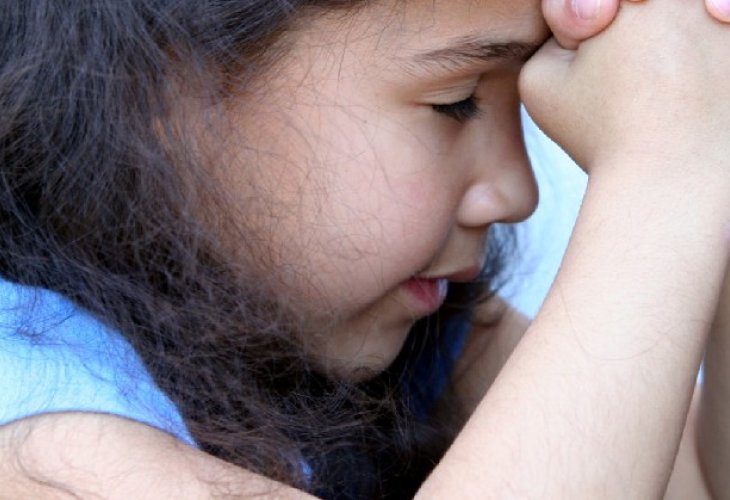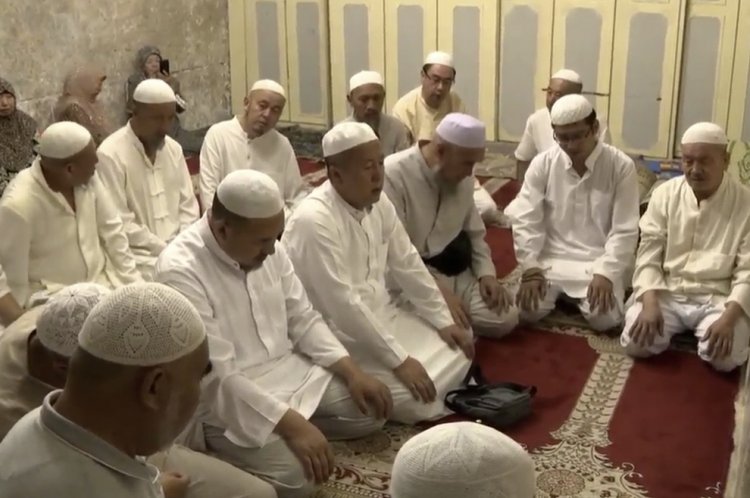The Muslim Whose Mother and Sister Were Murdered, Now Undergoing Conversion: "Judaism is the Holiest Religion"
25 years after his mother and sister were murdered in cold blood in the name of the Quran, Munir Munzar, a Lebanese-born Muslim undergoing conversion, breaks his silence. In an exclusive interview with the Hidabroot website, he talks about moments of loneliness, human cruelty disguised under the cloak of the Quran, and the first Yom Kippur he observed within Judaism.

We first became acquainted with Munir Munzar through an intriguing post that reached us indirectly after it was published on his Facebook page. "I am an Arab Muslim undergoing conversion, and I am very proud to have had the privilege to honor Yom Kippur and to go to synagogue to hear the prayers. Honestly, I was very curious and interested to know what is really said in your prayers and what the Jewish people pray for. I want to tell you that it moved me very much, even to tears, to hear them praying to Hashem to guard them and light their way, and praying for peace. I did not hear them praying for death to the Arabs, nor praying on how to harm another person. At that moment, I realized that this is truly the holiest and purest religion, for Judaism does not allow harming or killing another person, unlike other religions where people pray for the death of Jews. I want to send a message to all the religions in the world - that the Jewish religion is the purest, holiest, and most righteous... It's no wonder they say the Jewish people are the chosen people."
Naturally, we hurried to contact him, and to our delight, he agreed wholeheartedly to be interviewed: 'I am willing to do anything, just to deserve to be part of the Jewish people,' he said.
Munzar, 40, was born and raised in Lebanon as the youngest of six siblings. At the age of 12, he experienced a terrible tragedy when he lost his mother and sister, murdered by Hezbollah. The reason for the murder: his brother served in the South Lebanon Army. "It's not that we were pro-Israel," he painfully recalls, "we were simply against the terror that arose and grew back then. It started with Fatah, moved to Moqawama, and ended with Hezbollah. All we wanted was to live in peace, which is also why my brother enlisted in the army. But those brutal terrorist organizations didn't care—they searched for and found their revenge."

Childhood Hardship: Lived in an Abandoned Building for 3 Years
Munzar's parents divorced when he was a small child, and he was forced to live alternately with his father, who had remarried, and his single mother, who never remarried. By sheer luck, on the night of the murder, he was with his father. "To support us with dignity, my mother worked in the kitchen of one of the Israeli army's outposts, and then, later in the afternoon, sold falafel at her small stall. I remember how the morning after the murder, I went with my father to work in the neighboring village, Markaba, and on the way, we were stopped at a checkpoint and asked where we were going. My father replied that we were going to work, and the answer he received—I will never forget: 'What work, haven't you heard what happened? They killed your ex-wife and your eldest daughter.'
"They simply entered our home where my mother, my older sister, and the children of my brother serving in the army slept—and shot everyone. They murdered my mother and sister, and injured the children, without mercy. When I heard my mother's name, I almost fainted with sorrow. I was beside myself at that moment, saw black screens in front of my eyes, my world shattered into pieces. It was at this point that my hatred for the Muslim religion and those who claim to represent it began."
Even before his mother's death, the relationships among the siblings in the family were not very tight, but after the mother was killed—they further loosened.
And so, at age 12, instead of receiving the love and protection every boy his age needs, Munzar found himself living in an abandoned health fund building with his sister. "For three years, we lived in that building, without anyone caring about us. I worked in construction every morning for two years, just so we would have something to eat," Munzar recounts while wiping a lingering tear from his eyes, "My father remarried, and his children from previous marriages did not interest him. The house completely fell apart since my mother died. One brother didn't ask about the other; nobody cared whether I was alive or dead."
And what took you out of this situation?
"Even there, and until today, Hashem did not abandon me. A Lebanese officer who served in the South Lebanon Army found me and decided to take me under his wing, in order to help me. He took me and my sister under his protection, rented a house for us, and took care of all our needs."
After three years, at just 15, Munzar joined the ranks of the South Lebanon Army himself and served for ten years. Over time, he married a Lebanese woman and had two children with her, but in 2000, he decided to immigrate to Israel, a decision that had been brewing in him for a while.

"In the Quran I Know, It Does Not Say It's Permitted to Kill"
Discovering that his marriage was on the rocks, he decided to leave all familiar and painful memories behind in Lebanon and move to Israel. As a former SLA soldier, he received full support from the Shin Bet and the army and began his life here, with the same Muslim lifestyle.
Not loving the Muslim faith doesn't mean you must love the Jewish faith. What, nonetheless, drew you closer to it, to love it, and to want to be part of it?
"There were many things that led me to this, but I'll tell you one small thing—just to give you an example: In Israel, I lived as a Muslim for 14 years since I arrived here. I'm a sociable person, and naturally, I immediately connected with different communities of Israeli Muslims. They all talked to me, laughed, and seemed to love me. But on holidays, I never received an invitation from a friend to come and be hosted in their home. So much so, that for 14 years, I haven't celebrated Muslim holidays. However, two months before the last Yom Kippur—after I observed and understood the Jewish people and their behavior closely and decided I want to be Jewish—the moment I decided this, a Jew I already knew invited me to his home for Yom Kippur. On Sukkot, I received an invitation from another family to celebrate with them. Where else in the world are there people like this? Show me because I don't know.
"Among Muslims, before the leader ascends to speak at the mosque, he declares 'Death to the Jews' and only then begins the speech. They have problems because they create the problems for themselves. There are so many splits there, and each one says 'I am right,' and each one kills the other for his justice. Is this truth? It's a lie! They live by their swords, how can I believe in such a religion? In the Quran I know, it does not say it's permissible to kill. On the contrary. The Quran says a day will come when there's chaos on earth, and then Mohammad begins to cry. When asked why he cries, he says that all Muslims will be in hell. And why? Because Hashem is angry at their cruel behavior. Do you want to hear why I believe in the Jewish religion and why I want to live according to it? Because there, they say—'You shall not murder,' 'You shall not steal.' The Jewish religion makes me a better and calmer person since I know and study it."
Standing Under the Chuppah
Since deciding to join the chosen people, Munzar cut ties with all his Muslim friends. All he wants now is to earn the privilege to be a Torah-abiding Jew, despite not having the right to be born as one. He is in contact with a rabbi (of course, Orthodox) guiding the conversion process that has begun, knowing that Hashem hears his prayers. "I am sure that Hashem will open the way for me and help me receive this gift, to become Jewish, which is the best gift. I know I was born a Muslim to go through all these hardships I am enduring and ultimately become Jewish."
Asked if he is afraid of Muslims, Munzar answers without a trace of flattery or arrogance, that he fears only one. "I don't get into politics. I only express my opinion, from my personal experiences. Let everyone draw their own conclusions, I'm just sharing what I know—I have no bad intentions."
What is the hardest thing for you in this process?
"The hardest thing is the loneliness. I dream of standing under the chuppah as a Jew and building a true Jewish home, and I truly believe in my heart that it will happen. I don't know when, and that's the hardest thing for me. Yet, I believe that Hashem loves me and will help me achieve this."
Last Yom Kippur, Munzar experienced the Jewish experience—first in his life. "I fasted even though I don't have to, just to feel what Jews feel. I had a lot of curiosity to hear what Jews pray for, what they ask from Hashem. I spent the entire holiday in the synagogue, except for one break in the middle. And to tell you the truth? I was in complete shock. I was surprised to discover that in the Jewish religion, they don't say 'death to Arabs' before opening the Torah, as Muslims do before they open the Quran. I was moved to tears. Jews speak only good things to their Hashem, so why is there hatred towards them? I did not hear them praying on how to harm another person. At that moment, I understood conclusively that the Jewish religion is the holiest and purest religion in the world—because in this religion, unlike other religions whose people pray for the destruction of the Jews, people truly seeking peace live.
"I want to deliver this message to all Jews worldwide: I love you—and the people of Israel lives and endures—no one can stop it. Hashem guards and will guard the Jewish state, every Jew, everywhere they are. It’s no wonder they say the Jewish people are the chosen people. And now, my goal is to join them and observe the Torah and commandments in a true and complete way, with Hashem's help."

